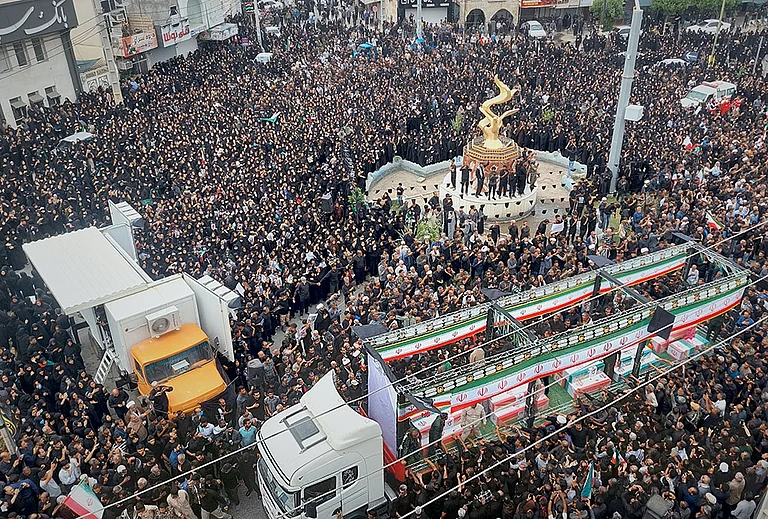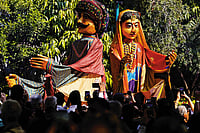My husband came home one evening and said excitedly that he was taking me to watch a play. He had also bought me a white silk sari—he loved white—and flowers for my hair. This was the first time he had done so. I felt so happy that I said, yes, let’s go. K.R. Gouri Amma was to recall that evening with fondness later. In the early 1960s, when Gouri went with T.V. Thomas for a Malayalam play, they were greeted with clapping and cheering from the audience. Clad in the sari he had gifted her that very day and with jasmines in her hair, she stood next to her young husband, just another woman in love. A decade later, that portrait of a happily married couple had been shattered, but the love that the two shared endured, kept alive by Gouri for over four decades even after T.V.’s death.
Gouri succumbed to age-related complications on May 11, two months shy of her 103rd birthday. In the twilight of an extraordinary life that saw her break many a glass ceiling in the vastly patriarchal pantheon of politics, Kerala’s Iron Lady—the architect of land reforms, the Communist icon who rebelled against her party at the age of 74—had, perhaps, had a lot of time to excogitate the steep personal cost she paid for her illustrious political journey. More so, perhaps, because that journey, at least in popular imagination, never ended at the destination that her followers, if not Gouri herself, believed was ordained for her. A popular legislator and minister of many terms in her state’s cyclical Communist governments, Gouri was, after all, the chief minister that Kerala never had.
In her later years, she had spoken at length to the media about her marriage, one that failed in the public eye. Widowed in 1977 but separated from her husband before that, both Gouri and T.V. were ministers in the first Kerala cabinet in 1957. Perhaps defeated by the political games she sensed afoot during the era in which she trailblazed Kerala politics, or echoing well-meaning platitudes, she did say once of her marital life in an interview, “I feel I should have been a little submissive.”
With each successive telling, an ache seemed to build within her to tell her truths, to set the record straight in deeply private realms. On the humid afternoon I reached her home in Alappuzha to interview her for a book on Kerala in 2009, she referred to her late husband frequently and fondly through both personal and political prisms; it was obvious the two always overlapped in her life. Clad in her usual white sari, biting into freshly plucked ripe mangoes with open relish, she took pains to arrange her memories chronologically in the courtyard of her home.
Almost a teenage rebel in the timing of her laughs and witty asides, it was difficult for me to reconcile to the fact that Gouri was going to turn 90 that summer. Distant memories came flooding back to her. She paced back over five decades to recall her entry into politics in the 1950s. “Those days the Communist Party was focused entirely on social uplift of the poor. They had a tradition of protests. The Nadar weaver women in southern Travancore started wearing bras even though, like Nair women, they were not permitted to cover their breasts. The Maharani prohibited this, which brought about the famous Nadar uprising. British intervention saw the Maharani withdrawing her directive…. The Communist Party had declared war against just such atrocities. The Punnapra Vayalar uprising hastened my entry into politics as a proud comrade.”
Politics also meant occasional imprisonment and physical torture, which her words from then describe graphically: “If police lathis had sperm, I would have given birth to a thousand lathis.” Dwelling on the time she was taken into police custody without any formal charges, she said, “I was accused of rajadroham, of being a traitor! Ironically, my family status helped me tremendously during my jail days. I got better treatment because I was the daughter of Kalathiparambil Raman! Women wardens and jail inmates were fond of me. In fact, a jail superintendent was even transferred because they thought he gave me preferential treatment…. Most of our comrades fought elections from the underground.... Out of the 108 who contested, 32 comrades, including me, won. I drove out of jail in my elder sister Devaki’s car. ”
Any mention of her time in jail inevitably brought Gouri to the topic of her husband—how they met and how he romanced her. “Jails remind me of romance,” she said. “Much before we got married, T.V. and I were in jail together. He would toss a stone over the wall to tell me that the coast was clear for me to throw my letter to him. That is how we exchanged love letters…. The prisoners were allowed a walk around the courtyard at a prescribed time, and that was when he tracked me down and wooed me.”
The Gouri-T.V. love story weathered storms from within and without, especially after they found themselves in separate parties when the CPI split in 1964; he stayed with the parent party, but she moved on to the newly formed CPI(M). Sifting through memories, amidst confessing her love for Ayurveda oils and to some amount of vanity about her feet, which she said she took really good care of, she leaned forward to punctuate her next words with an index finger.
“One thing I can tell you for sure—T.V. loved me. It was the vested interests of certain people that drove us apart. I know in my heart that he loved me till the very end, that he never stopped loving me—and that is all that matters to me despite what people may say. When I met him in Bombay in 1977 at the hospital where he was being treated for cancer during his last days, he had tears in his eyes. He did not say a word, but it was obvious what he felt for me. It was written all over his face,” she said briskly.
(Antony, a Bangalore-based writer, has compiled the anthology Kerala, Kerala, Quite Contrary)


















